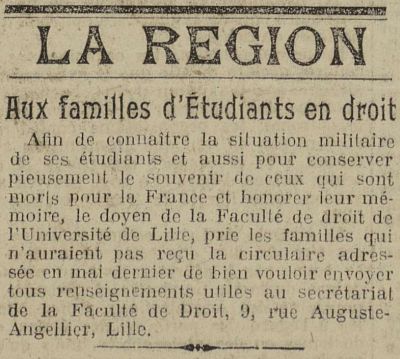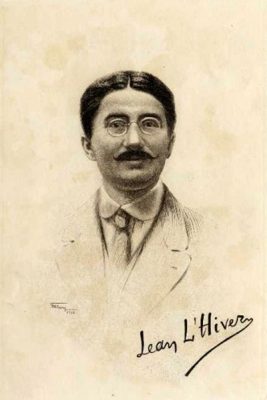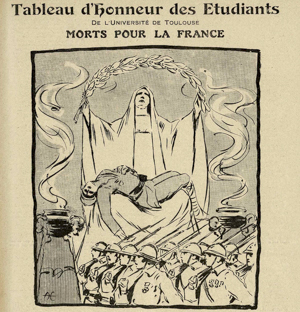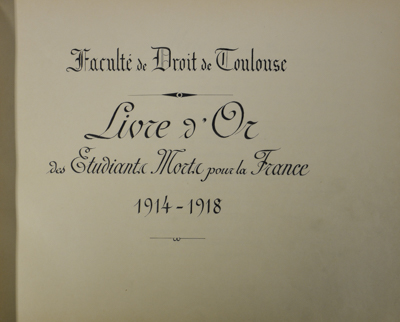Traces of memorial practices in remembrance of law faculty academics who died during the Great War : Brussels, Leuven, Liège
Those who gave their lives for an ideal of justice, those who died for the law, have left the survivors a legacy that must not be made up solely of contempt and hatred. Paul Héger, Academic opening session of the Free University of Brussels, January 21, 1919. Confronted with the magnitude and violence of the mass death caused by the Great War, the deep trauma that ensued drove society towards an irrepressible need to mourn and remember those lost. Mourning is an intrinsic part of the war experience. It is present from the outset of combat and continuing after the war, and is a bond that unites combatants and non-combatants in the loss of a son, husband, brother, or “comrade”. Its expression is multifaceted : it tends topour lire la suite…
War and student death at the Lille Faculty of Law (1914-1918)
The commemorative plaque, now set in front of the entrance, in the largest hall of the Lille Faculty of Law, does not attract attention. And yet it is up for everyone to see, both from the ground and from the hallways, in particular the one leading to the hall of acts, where the audience gathers during the defense of theses. Although the commemoration of the centenary of the First World War sparked a renewed interest in this monument, it has absolutely nothing to do with the emotion that gripped all those who, in the aftermath of the conflict, lifted their eyes to the impressive list of names engraved in marble. Mass death At the start of the 1913-1914 school year, there were 351 students. At the firstpour lire la suite…
Stories of Bordeaux students who “died for France”
The outbreak of war in the summer of 1914 led all European states to solicit the greatest sacrifice from their able-bodied male population. Thus France solicited most of its twenty years old citizens, nineteen even, till the past forty, to join the ranks of the active army. Even if the students appeared as a minority, their departure to the front left a mark. By themselves, they embodied youth, as students were the only social group composed almost exclusively of young people. From then on, the faculties concentrated what could be called “the youth of France”, scrutinized in particular by journalists. In the provinces, student populations were much less important than in Paris. Nevertheless, they continued to grow, as in Bordeaux, where the number of studentspour lire la suite…
On the war memorials at the Toulouse Faculty of Law
“Et puis honneur à nos grands morts qui nous ont fait cette victoire ! [And honored be our great dead, who made this victory for us!]” Georges Clemenceau, Chamber of Deputies, November 11, 1918 Men live. They also die, sometimes very young and before their time. Memento mori ! Remember death, the old societies repeated. Our old masters liked to quote Latin – the authorities and philosophers of our Antiquity. Death is inevitable, but seems far ahead of us. But in the heat of August 1914, once war was declared, death did not prowl. It was present, everywhere, often, for those who had gone to the borders to defend the country. As provided for by the provisions of the General Staff since the spring of 1914, Plan XVIIpour lire la suite…
Institutional memory : the Livre d’Or of the Toulouse Faculty of Law
From the very beginning of a war that was quickly imagined victorious, the loss of life proved to be immense and, to keep the accounts up to date, no one waited for the law of October 25, 1919 “relative à la commémoration et à la glorification des morts pour la France au cours de la Grande Guerre [relating to the commemoration and glorification of those who have died for France during the Great War]” providing for the constitution of a Livre d’Or, which was to list the names of the sons of each commune who took part in the conflict. For financial reasons, the planned 120 volumes would not see the light of day. Like many other institutions, the Toulouse Faculty of Law quickly tookpour lire la suite…





